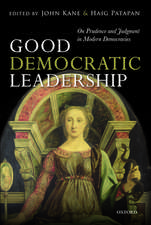Colossal Control Failures: From Julius Caesar to 9/11
Autor Jack P. Gibbsen Limba Engleză Paperback – 28 feb 2011
| Toate formatele și edițiile | Preț | Express |
|---|---|---|
| Paperback (1) | 323.32 lei 6-8 săpt. | |
| Taylor & Francis – 28 feb 2011 | 323.32 lei 6-8 săpt. | |
| Hardback (1) | 709.78 lei 6-8 săpt. | |
| Taylor & Francis – 30 mai 2008 | 709.78 lei 6-8 săpt. |
Preț: 323.32 lei
Preț vechi: 416.45 lei
-22% Nou
Puncte Express: 485
Preț estimativ în valută:
61.87€ • 64.52$ • 51.42£
61.87€ • 64.52$ • 51.42£
Carte tipărită la comandă
Livrare economică 21 martie-04 aprilie
Preluare comenzi: 021 569.72.76
Specificații
ISBN-13: 9781594515279
ISBN-10: 1594515271
Pagini: 304
Dimensiuni: 152 x 229 x 18 mm
Greutate: 0.41 kg
Ediția:1
Editura: Taylor & Francis
Colecția Routledge
Locul publicării:Oxford, United Kingdom
ISBN-10: 1594515271
Pagini: 304
Dimensiuni: 152 x 229 x 18 mm
Greutate: 0.41 kg
Ediția:1
Editura: Taylor & Francis
Colecția Routledge
Locul publicării:Oxford, United Kingdom
Recenzii
"Over the years, Jack Gibbs has taken me step-by-step through an elaboration of the concept of social control to his argument that control should be sociology's central notion to his formulation of a theory about control. His latest installment, Colossal Control Failures, should draw the greatest attention because it addresses historical events and issues that are important to both scholars and the general public, ranging from failures in attempted control by Julius Caesar, three presidents and a variety of dictators to revolutionaries and the attempt to control AIDS. His treatment of
9/11 is enlightening and should be required reading for anyone who would like some guidance on how to avoid such colossal failures in the future."
—Gary F. Jensen, Vanderbilt University
The hallmark of this trenchant analysis of colossal control failures is Gibbs' insistence on conceptual clarity and rigorous analysis, a welcome change from facile claims based on preconceived and politically motivated prescriptions and proscriptions. From Julius Caesar to "America's Worst Day" (9/11) this book is a timely warning against the hubris of political, economic, and religious exceptionalism. Gibbs strengthens his claim for control as the central notion of sociology.
—James F. Short, Jr., Washington State University
9/11 is enlightening and should be required reading for anyone who would like some guidance on how to avoid such colossal failures in the future."
—Gary F. Jensen, Vanderbilt University
The hallmark of this trenchant analysis of colossal control failures is Gibbs' insistence on conceptual clarity and rigorous analysis, a welcome change from facile claims based on preconceived and politically motivated prescriptions and proscriptions. From Julius Caesar to "America's Worst Day" (9/11) this book is a timely warning against the hubris of political, economic, and religious exceptionalism. Gibbs strengthens his claim for control as the central notion of sociology.
—James F. Short, Jr., Washington State University
Cuprins
Part I Preliminary Matters; Chapter 1 The Ubiquity of Control Failures, the Nature of Attempted Control, and Some Control Principles; Chapter 2 Control over Human Behavior and the Notion of Power; Part II Colossal Control Failures by Three American Presidents; Chapter 3 Herbert Hoover’s Nightmare; Chapter 4 FDR’s Failed Attempt to Pack the Supreme Court; Chapter 5 Richard Nixon’s Stonewalling; Part III Colossal Control Failures by Three Revolutionaries; Chapter 6 Robespierre Reaches Far too Far; Chapter 7 Trotsky’s Fatal Misperception of Stalin; Chapter 8 “Che” Guevara; Part IV Colossal Control Failures by Two Dictators; Chapter 9 Caesar Crosses the Rubicon; Chapter 10 Hitler’s Putsch and His Invasion of the U.S.S.R.; Part V Some Other Colossal Control Failures; Chapter 11 The Juice Walks; Chapter 12 AIDS; Chapter 13 Control Failures and 9/11, America’s Worst Day; Part VI Major Implications; Chapter 14 Some Hopefully Significant Comparisons; Chapter 15 Bearing on the Future;
Descriere
Analyses control failures throughout history, including Robespierre's promotion of the French Revolution, and Hoover's efforts to stop the Great Depression.






